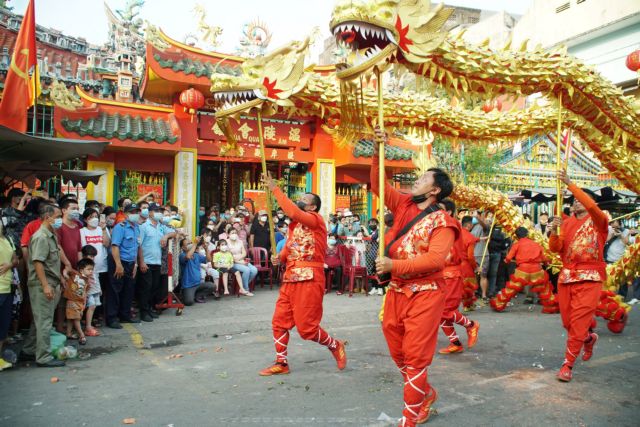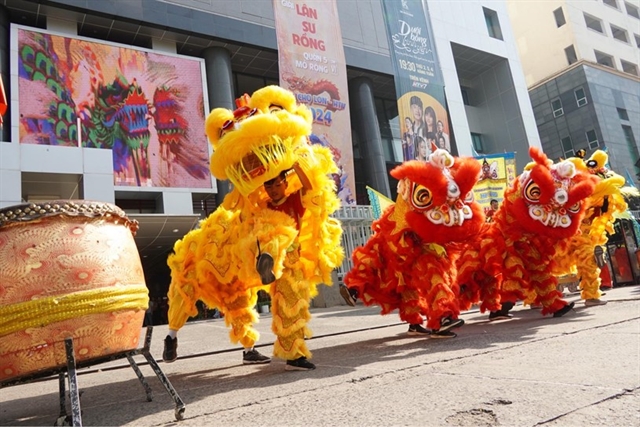Kylin dance to become part of intangible cultural heritage of humanity
Culture - Ngày đăng : 08:25, 27/08/2024
 |
| PASSIONATE DANCE - Múa lân sư rồng (kylin-lion-dragon dance) is often performed by the ethnic Hoa (Chinese-Vietnamese) who account for around 4 per cent of HCM City’s population. The dance is a mixture of dance, martial arts and passion. VNA/VNSPhoto by Thông Hải. |
HCM CITY — HCM City has submitted a document to the Ministry of Culture, Sports and Tourism to name the art of kylin-lion-dragon dance by local people on the list of intangible cultural heritage of humanity of Việt Nam.
Local authorities are working with experts from the city’s Kylin-Lion-Dragon Dance Union to recognise the dance as a national intangible cultural heritage of humanity, according to the Department of Culture & Information.
Múa lân sư rồng (kylin- lion- dragon dance) is often performed by the ethnic Hoa (Chinese-Vietnamese) who account for around 4 per cent of HCM City’s population. Many Hoa people live in Chợ Lớn (Big Market) in District 5 and District 11.
The dance is usually performed to bring luck and happiness during the traditional Tết (Lunar New Year) Festival, Rằm Trung Thu (Mid-Autumn Festival) on the 15th day of August in the lunar calendar, and at ceremonies to open a new business or build a new house.
HCM City has 60 amateur and professional troupes of kylin-lion-dragon dance, including Nhơn Nghĩa Đường and Kiến Thắng Đường of Chợ Lớn, which have 100-200 members each.
Lân (kylin), sư (lion) and rồng (dragon) are symbols of power, wisdom and good fortune. They chase away evil spirits and bring happiness, longevity and good luck.
The performers wear black and white costumes that symbolise the balance of âm (yin) and dương (yang), as well as red fabric belts that show their passion for martial arts.
During Tết (Lunar New Year), they use red clothes for luck. They play different drums to excite the audience and also perform circus acts.
 |
| PASSIONATE DANCE - Múa lân sư rồng (kylin-lion-dragon dance) is often performed by the ethnic Hoa (Chinese-Vietnamese) who account for around 4 per cent of HCM City’s population. The dance is a mixture of dance, martial arts and passion. VNA/VNSPhoto by Thông Hải. |
Múa lân sư rồng of the ethnic Hoa in Chợ Lớn consists of both traditional and modern performances.
Modern dances feature the ông địa (God of Earth) and a dragon dancing together.
One of the featured kylin dance in traditional style called Lân Lên Mai Hoa Thung (Kylin Climbs Mountains).
The dance presents a kylin head to the highest mountain. The lead dancer has to jump from the lowest pole of one metre high to the highest of 1.7 metres. There are 10 poles spaced metres apart.
Masters of the dance and veteran performers at leading troupes have taught dance techniques and skills to younger generations for hundreds of years.
Skilled performers spend two years practising difficult dances.
“Múa Lân Sư Rồng of the Hoa in Chợ Lớn is a mixture of dance, martial arts and passion. I think the Vietnamese dragon dance art has developed very well,” said master Lưu Kiếm Xương, head of Nhơn Nghĩa Đường, who has 40 years of experience.
Nhơn Nghĩa Đường was established in 1936. Since the 1990s, the troupe has won several top prizes at international kylin dance festivals.
City authorities have worked to support Nhơn Nghĩa Đường and other troupes to preserve their art.
In January, the city organised the Kylin-Dragon Dance Festival, attracting 50 troupes from 15 cities and provinces across the country.
The event aimed to highlight the quintessence of the art, and promote the cultural and tourism products of District 5 and the city as a whole to local people and international visitors.—VNS
